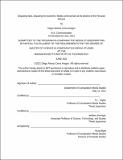Disputing facts, disputing the economy: Media controversies at the decline of the Peruvian Miracle
Author(s)
Cerna Aragon, Diego Alonso
DownloadThesis PDF (2.399Mb)
Advisor
Taylor, T.L.
Deringer, William
Terms of use
Metadata
Show full item recordAbstract
During the first decades of the twenty-first century, Peru experienced a major GDP growth catalogued by authoritative sources as an economic miracle. Many credited the miracle to two factors: the boom of mineral prices – Peru’s primary export – and the free market reforms implemented by the authoritarian government of Alberto Fujimori in the early nineties. This period of prosperity lead some to suggest – either favorably or critically – the existence of a monolithic optimistic consensus in Peruvian society.
In this thesis I put the monolithic quality of this consensus to the test by surveying media controversies in recent years (2016 – 2019), a period marked by a decline of GDP growth. These controversies confronted different actors that are normally considered part of this consensus: government technocrats, business journalists, corporate leaders, etc. The analysis employs key concepts from Actor-Network Theory and other Science and Technology Studies works to examine how these actors mobilized information about the national economy in their public interventions.
The main argument advanced in this thesis is that economic information employed in these controversies operated as sociotechnical nonfictions that attained “enough realness” through their circulation in media and the affective states they evoked. The concept of sociotechnical nonfictions highlights the role that expertise and media assemblages played in the (re)production of facts. Furthermore, it also compels to evaluate the force that media researchers assign to the effects of an economic regime.
Date issued
2021-06Department
Massachusetts Institute of Technology. Program in Comparative Media Studies/WritingPublisher
Massachusetts Institute of Technology